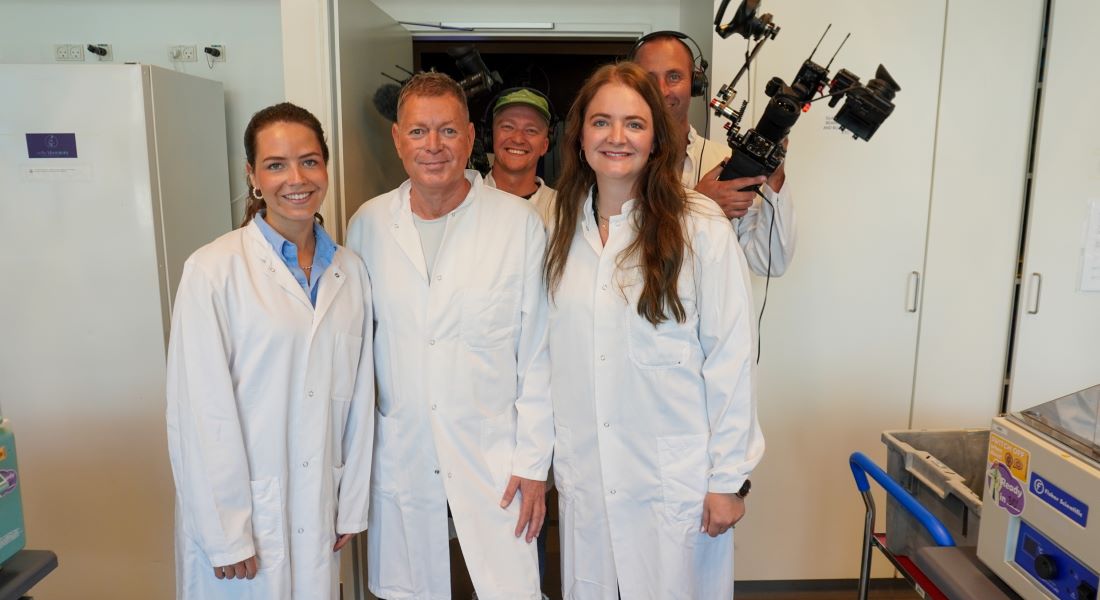BRIC researcher participates in prime-time TV-show to explain how fundamental research can help cancer patients
This year, Fena Ochs, group leader and associate professor at BRIC, is part of the “Knæk Cancer” fundraising show by the Danish Cancer Society and Danish TV-channel TV2. She shows how Knæk Cancer supports her research in breast- and ovarian cancer.

When Fena Ochs and her research group study images of cancer samples, they are looking for changes that can explain why many women with a mutation in the BRCA1 gene develop breast- and ovarian cancer and, in many cases, later develop resistance to existing therapy.
”My hope is to publish our results and to see a pharmaceutical firm translating this knowledge into a lifesaving treatment in the future”
As part of Danish Cancer Society’s fundraising show on Danish National Television, a video crew accompanied by the show’s host, the Danish actor Peter Frödin, visited Ochs’ lab to learn how the funding and support from Knæk Cancer affects their research.
“It means a lot to us to receive funding from Knæk Cancer donated by the Danish people and companies. It gives us an everyday mission in the lab: to make discoveries that in the future will save the lives of breast- and ovarian cancer patients,” Fena Ochs says.
The Ochs Lab received DKK 3.1 million in funding from the Knæk Cancer 2023 show. The funding was given to study the molecular consequences of BRCA1 mutations in cancer, and especially mechanisms that cause poor treatment prognosis due to drug resistance.
Mutated genes lead to cancer
For patients with hereditary breast- and ovarian cancer, the cause of the disease can in many cases be found in a gene called BRCA1. Healthy BRCA1 will repair the damage that frequently occurs in the body’s cells, while a mutated BRCA1 is not capable of doing so. This can result in damaged cells building up over time leading to aggressive breast- and ovarian cancer.
By developing a new microscopy technique, Fena Ochs and her research group are able to examine BRCA1 on a single molecule level, which allows them to discover molecular changes in cancer. Understanding the exact molecular changes can pave the way to new treatment strategies.
The need for new treatment strategies is particularly important due to treatment resistance. When a woman is diagnosed with breast- and ovarian cancer she is offered chemotherapy. While these drugs are very effective in the beginning, many patients will over time develop resistance, meaning that they will not respond to the treatment as well anymore. This can then allow cancer to return.
“We lack knowledge on why so many patients at some point stop responding to therapy,” says Fena Ochs. “If we understand how to overcome this resistance, we can resensitize the patients and increase their survival chances,” she adds.
By unraveling these mechanisms and processes, she hopes to be able to explain what leads to drug resistance.
Ambition to contribute to treatment
As part of the Knæk Cancer 2024 show Fena Ochs had the chance to show how her lab is determined to bring forward the needed knowledge to the public.
“Fundamental research is critical to our improvement of treatment,” she says, “and the funding that we received from Knæk Cancer enables us to do this research”.
Their goal is to see their findings translated into clinical use.
“My hope is to publish our results and to see a pharmaceutical firm translating this knowledge into a lifesaving treatment in the future,” Fena Ochs says. “This is what drives us every day,” she adds.
Find the the interview with Fena Ochs at Danish Cancer Society's website through this link. The video is at the end.
